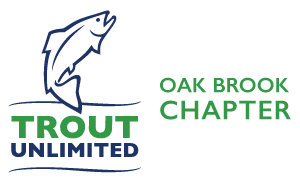President’s Letter
Greetings Oak Brook TU members and friends:
As I write this letter, my thoughts are of a great Oak Brook TU “Trout-on-Tap” gathering that took place on January 29 at Miller’s Ale House in Lombard. Sixteen members braved the brisk winter weather including a good mix of chapter old-timers and newer members. Tall tales were swapped, members enjoyed getting better acquainted and upcoming chapter events were discussed. As I was departing, two attendees asked me, “When is the next Trout-on-Tap?” I went home inflated by the camaraderie. I hope you are able to join us for our next social event.
This month, I would like to shine some light on our chapter’s advocacy effort, a key part of Trout Unlimited’s conservation program. Advocacy includes activities to influence decisions regarding our coldwater conservation mission within political, economic and social institutions. Advocacy can include media campaigns, public speaking, lobbying efforts, direct communication with members of the Illinois state and federal legislature, and other activities. From time to time, Oak Brook Trout Unlimited (OBTU) will request your assistance with our advocacy efforts through our “Advocacy Alert” email messages requesting you to take specific actions.
You may be interested in the results of our most recent Advocacy Alert to communicate our support for federal funding of fish habitat improvements which includes continued funding for our beloved four-state “Driftless Area”. The Advocacy Alert was emailed to 880 OBTU members this past December. 11. The message was opened by 252 members (32%). Based on members who opened the draft letter to our legislators, as many as 24 email messages were sent to Senators Dick Durbin and Tammy Duckworth, as well as each individual member’s Congress person (e.g. Sean Casten in my case). I was encouraged by the OBTU response and actions. At the same time, we can do much better. Imagine the day when 800 messages from OBTU members turn up in Senator Durbin’s email box! We have power in our numbers. Please consider participating in future advocacy alerts. For this recent call to action, I took very little time and effort to make a couple of edits to the provided draft letter and send it out. I received email letters from Senators Durbin and Duckworth, as well as Congressman Casten giving me the satisfaction that my voice had been heard.
I would like to thank Ed Michael for leading the Illinois TU Council and OBTU advocacy efforts for many years. Ed likes to remind me that even when the major coldwater issues arise in places like Alaska and other western states, Illinois often has more congressional seats and votes due to our larger state population. Our Illinois voice on issues across the country (such as Alaska’s Pebble Mine) matters in addition to our advocacy of local issues (e.g. Asian Carp).
If anyone would like to help Ed lead our chapter advocacy efforts, please let me know.
Sincerely,
Willie Beshire
President, Oak Brook Chapter of Trout Unlimited
E: [email protected]
M: 630.200.2532
Oak Brook TU Awarded Bass Pro Shops and Cabela’s Outdoor Fund Grant for “Trout in the Classroom” Program
Bass Pro Shops and Cabela’s Outdoor Fund has awarded a financial grant to support the Oak Brook chapter of Trout Unlimited with its purchase of an aquarium set-up for schools and 2020 program-wide support for its “live bugs” entomology classes at other Chicago area participating schools.
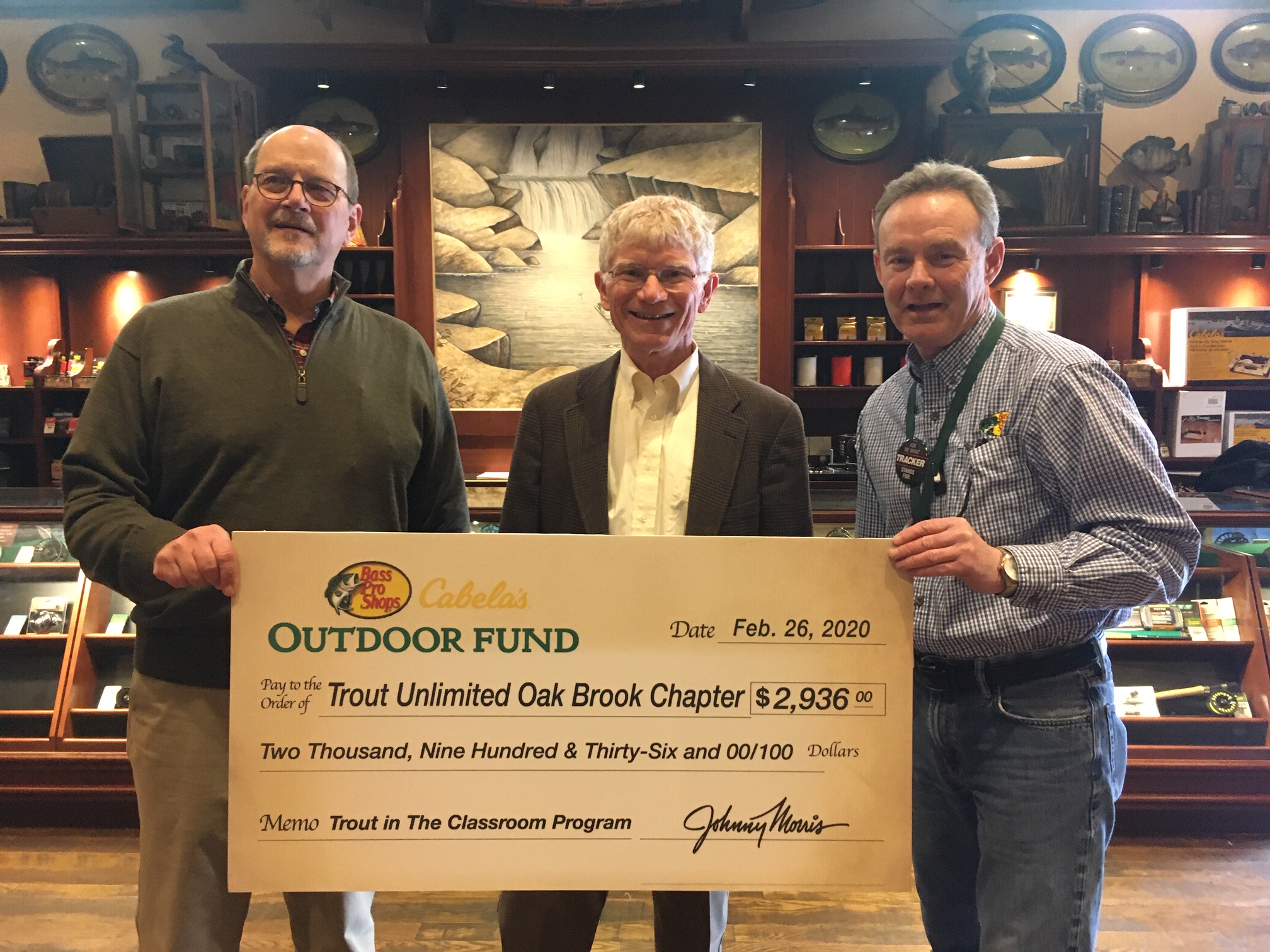
Bolingbrook Bass Pro Shops Store Manager Marty Nealon (right) presents a Bass Pro Shops and Cabela’s Outdoor Fund financial grant to Marvin Strauch (left) and Willie Beshire (center)
2019 Rod Raffle Reels In $2,830!
Oak Brook Trout Unlimited would like to thank everyone who participated in our 2019 Rod Raffle which generated $2,830 toward covering our annual operating costs covering monthly meeting facility rental fees, speaker fee and/or travel expense, membership communications, our website and administrative expenses (insurance and miscellaneous fees). We must provide Chapter funding for these programs because there are no other outside sources of funding. National Trout Unlimited membership dues are not shared with our Chapter for funding our local conservation activities, youth programs and general operating expenses.
The annual fundraiser featured 75 participants, with another 26 providing $1,589 “restricted” donations to the chapter’s conservation, youth camp scholarships and endowment fund.
The first prize winner was Ed Costin of Oak Lawn, who selected a Loop 4wt Evotec Rod and Q Reel—a $625 retail value. The Loop rod and reel outfit was donated by Javier Guevara of In the Loop Outfitters.
The second prize winner was Tom Wilhelm of Wheaton who received a Yeti 45-Quart Tundra Cooler.
Ten third prize winners received a $25 Orvis Gift Card: Willie Beshire and Tom Wilhelm of Wheaton; Lisa Gilmore of Riverside; Brian McPheters of Champaign; Rick Rowe of Glen Ellyn; Allan Sherman of Wheeling; Pete Sullivan of Naperville; James Watts of Forest Park; and Joe Weisenberger of Ashland, Oregon.
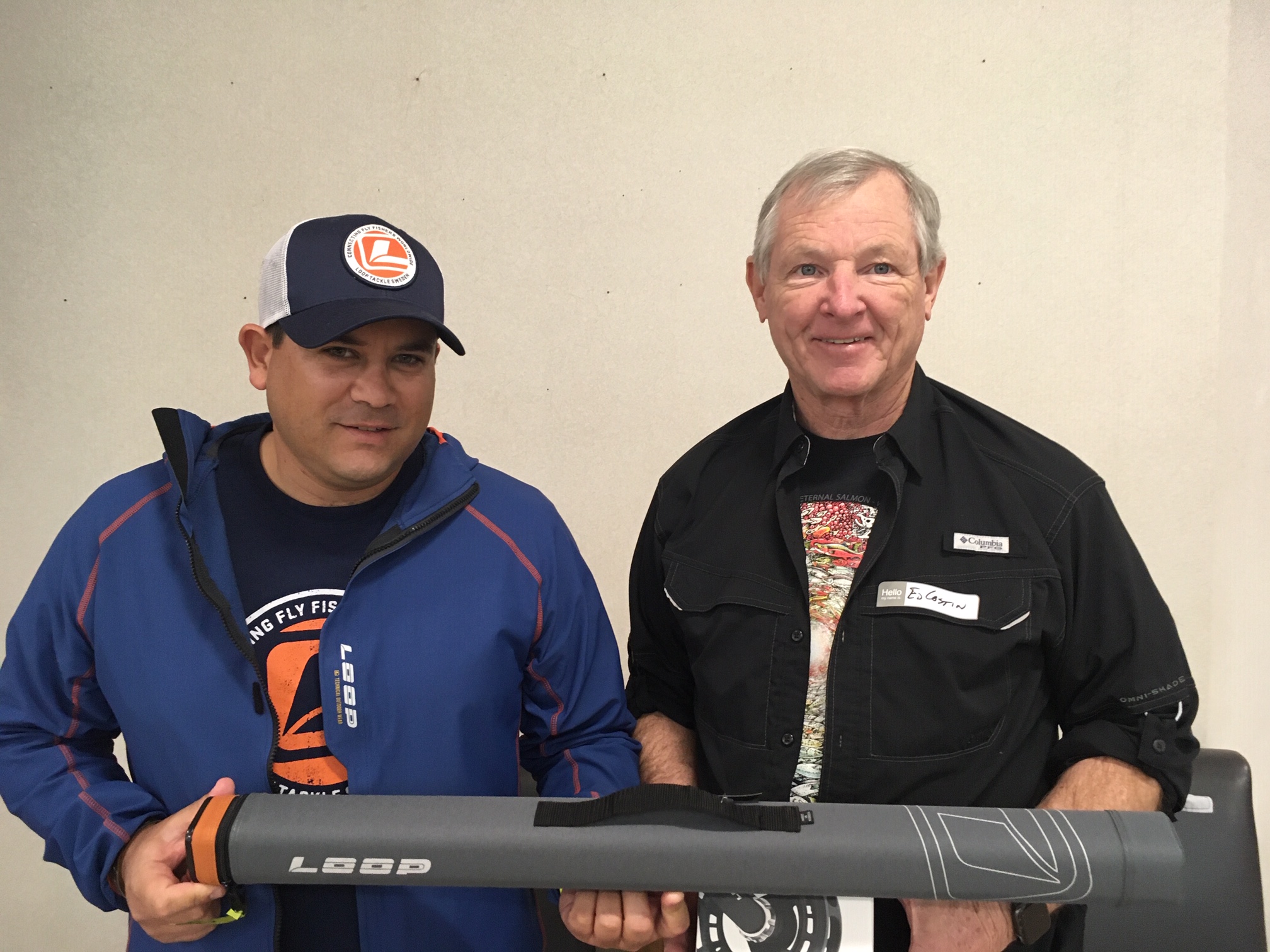
Javier Guevara, owner and guide for “In the Loop Outfitters” (left), presents Ed Costin of Oak Lawn with a Loop 4wt rod and reel as the 2019 Rod Raffle first prize.
December Annual Holiday Party a Social and Financial Success!
Our December 11 Holiday Party at the Arrowhead Golf Club in Wheaton drew 51 members and guests for our annual social event and fundraiser. The Holiday Party–which included a silent auction and bucket raffles–netted a record $5,833 after expenses.
Special thanks to the following guides who donated one-day trips for two anglers:
Betsie River–Pat Moore of Moore Outfitters.
Driftless Area–Kyle Zempel of Black Earth Angling.
Muskegon River–Kevin Feenstra of Feenstra Guide Service.
Northern Illinois Rivers–Mike Allen and Kurt Nelson of Midwest Waters Angling Co.
Please support these guides as you make your 2020 fishing plans. For a list of other OBTU “business partners” and past donors to our Holiday Party and monthly raffles, please see our website Business Partners page in the “About Us” section.
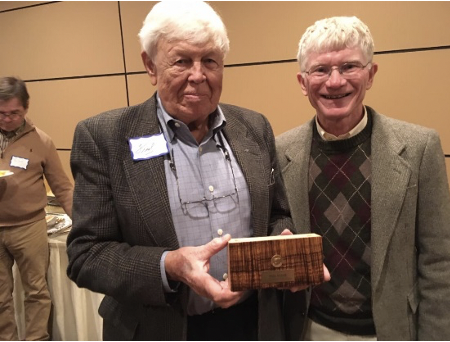
The late Fred Hodge accepts an OBTU Lifetime Service Award at the 2019 Holiday Party.
OBTU Kicks Off Monthly Fly Fishing Tips Forum Starting Febuary 25
Join Oak Brook TU once a month for a fly fishing forum we are calling “Fishing Tip(pet)s”. All skill levels are welcome as we meet to discuss all things fly fishing and Oak Brook TU on the last Tuesday of each month. Each night will have a theme, but all topics are welcome in this informal roundtable format.
Our inaugural event centered on the theme of “gear”. The March 31 theme will be “Fly selection and knot basics” at a location TBD.
The plan is to rotate meeting locations at area libraries.
Contact Phil McCluskey for more information:
E: [email protected]
M: 815-641-2725
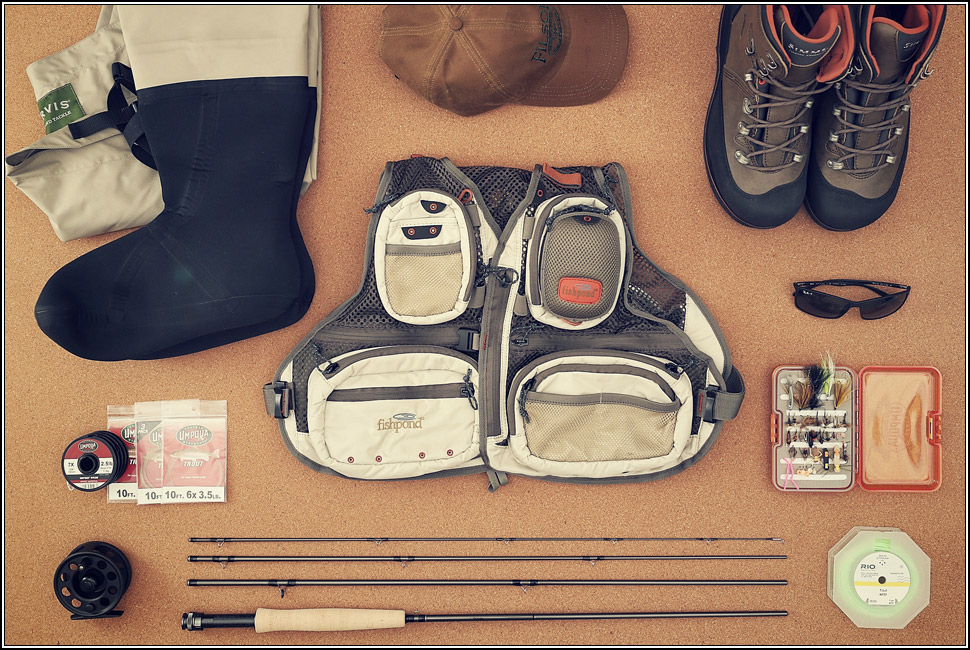
Fishing Gear
March 18 “Spring Fling” Open House
Mark your calendar now for an Open House on Wednesday, March 18, from 6 to 9 p.m. at the Oak Brook Recreation Center Central Park West Building.
The organization’s open house event is free to its members, friends and general public.
The event has something for everyone:
- An evening of fellowship and networking with your TU colleagues.
- Fishing information for Midwest locations for trout, steelhead, salmon and smallmouth bass.
- Oak Brook TU membership-hosted weekend fishing trips. See the “Fishing Trips” page on our website for more details.
- Oak Brook TU information tables on conservation volunteer activities planned for the 2020 summer and fall seasons as well as youth education and advocacy programs.
- Orvis, Loop, DuPage Fly Fishing and Filson representatives will be on hand with their latest 2020 fishing gear and apparel.
- Illinois guides Will Winans of Big River Fly Fishing, and Mike Allen and Kurt Nelson of Midwest Waters Angling will be there to talk Illinois river smallmouth fly fishing.
- $50 gift card to the new Filson Naperville store as a door prize raffle for all attendees plus a bucket raffle featuring fishing gear, wine, beer and other prizes.
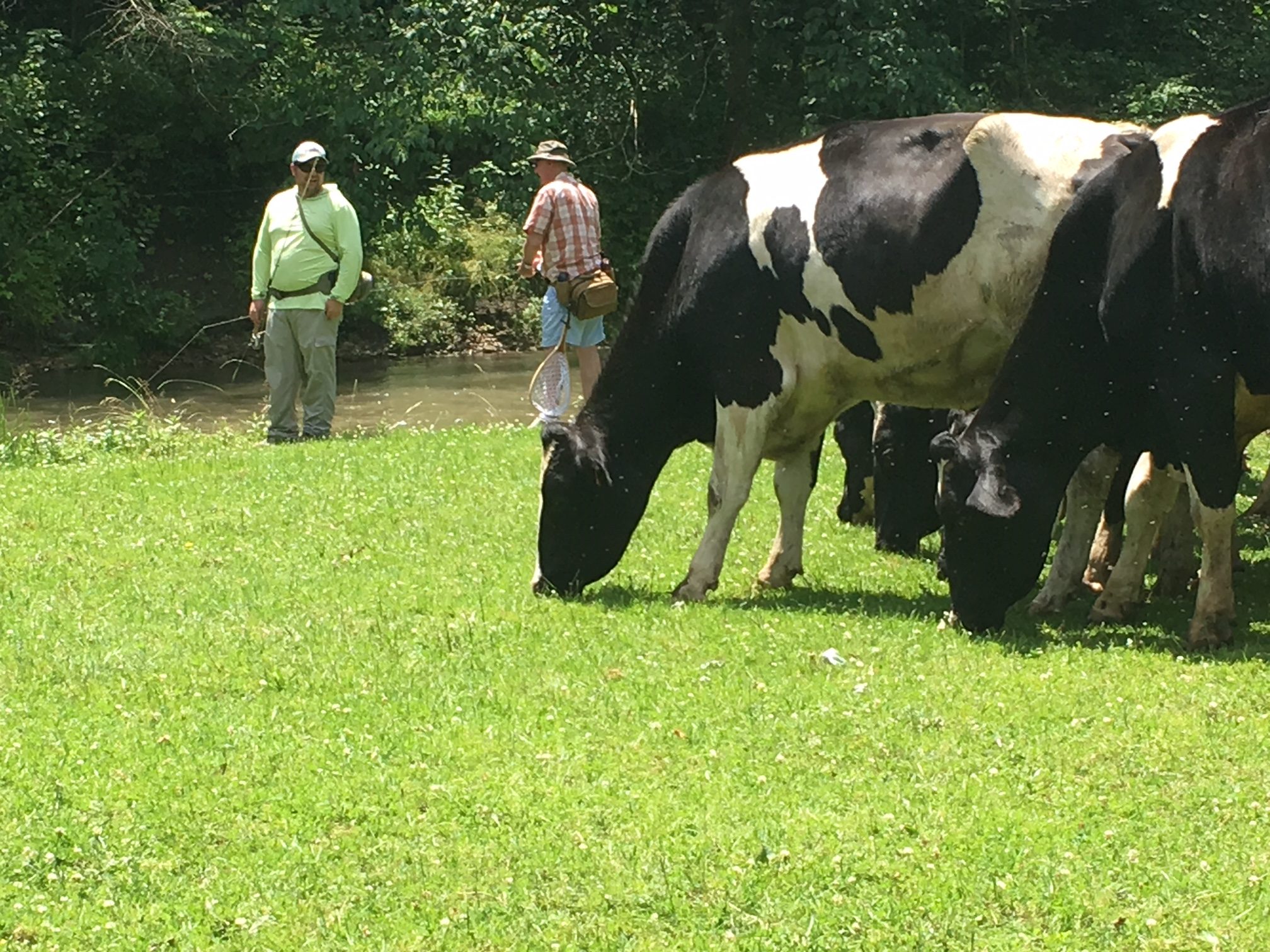
Learn about Midwest fishing locations, meet local guides and fishing gear reps, and sign up for Spring and Fall Fly Fishing Weekends.
Iron Fish Distillery Newest Business Partner
Iron Fish Distillery is Michigan’s first working farm solely dedicated to the practice of distilling small-batch craft spirits. It reclaimed a late 1890s abandoned farmstead with a simple mission: create exceptional spirits from the ground up, growing its own grain and sourcing grain from Michigan farmers with practices that respect the health of nearby watersheds, including the Betsie River.
Located in Thompsonville, Michigan, the Iron Fish Distillery takes its name and logo from the wild steelhead that run in the nearby Betsie River.
Iron Fish Distillery products are available for home delivery orders through their Chicago distributor Big Fish Spirits website. Iron Fish products can be found through their Big Fish Spiits profile here:Iron Fish Distillery Products
The Big Fish Spirits code for free shipping for orders over $75 (this is usually at the $150 mark) is: SHIP75
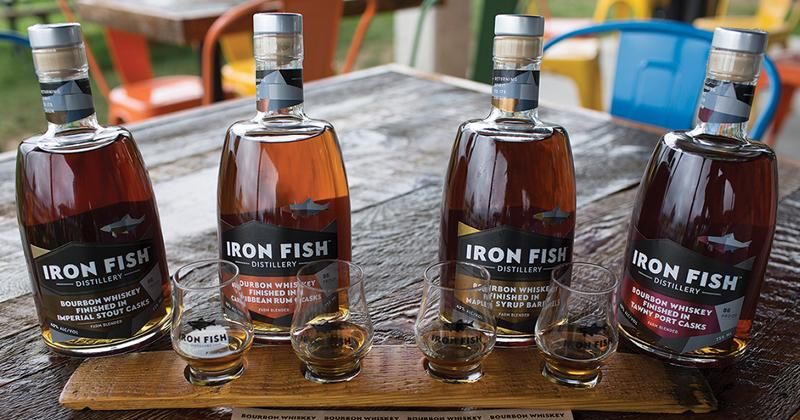
Iron Fish Distillery products are available for home delivery orders through their Chicago distributor Big Fish Spirits website.
The Michigan Arctic Grayling Initiative
By Jim Schmiedeskamp
At our November 18 membership meeting, Nicole Watson, a Ph.D. student at Michigan State University, reviewed her research work in support of the Michigan Arctic Grayling Initiative. The reintroduction of Arctic Grayling—a historical species that was extirpated in the early 1900s—to their native Michigan rivers and streams is being led by the Michigan Department of Natural Resources, in partnership with the Little River Band of Ottawa Indians (LRBOI).
Michigan’s history with the Arctic Grayling is long and storied. A striking fish with a sail-like dorsal fin and a slate blue color on its body, it was virtually the only native stream salmonid in the Lower Peninsula until the resident population died off nearly a century ago.
Michigan’s Arctic Grayling Initiative consists of more than 40 organizations in addition to the DNR’s and LRBOI’s foundational partnership and is committed to re-introducing this culturally significant species.
“Our formal mission as an initiative is to restore self-sustaining populations of Arctic Grayling within its historic range in Michigan,” said DNR Fisheries Division Assistant Chief Todd Grischke.
“The fact we have a town named after this fish indicates to me just how iconic it was and still is to many in this state,” Grischke said. “When you add in other factors—such as the fact they’re only native to Michigan and Montana out of all the lower 48 states—it just adds to their legendary status.”
19th Century Extinction Causes
In the 19th century, northern Michigan streams were filled with Arctic Grayling offering anglers plenty of opportunity to catch these unique fish. But a variety of factors slowly erased their presence, including the cutting of Michigan’s vast virgin forest in the 1800s.
“Logging practices during that time period used streams to transport trees that were harvested. The streams carried logs to mills for processing,” explained Grischke. “These practices greatly impacted the physical nature of those streams and basically destroyed stream habitats for fish, including grayling spawning areas.”
Additionally, the physical cutting of the trees caused blockages in many of those same streams, often displacing grayling from where they lived.
But this was just one issue that affected Michigan’s Arctic Grayling. Another was the introduction of non-native fish species.
“Other species of trout were introduced into Michigan’s waters to create additional opportunities for anglers to pursue, but a consequence of this action was that grayling couldn’t compete with more aggressive fish like brown, rainbow or brook trout,” Grischke said.
The final nail in the coffin was over fishing that occurred readily with people harvesting the grayling in large quantities with no possession limits or other regulations to stop them.
The last Arctic Grayling on record in Michigan were taken in 1936, but since that time natural resource managers have repeatedly looked for options to reintroduce it.
Previous Re-introduction Attempts Fail
“In the late 1800s and early 1900s, millions of Arctic Grayling fry were stocked into Michigan streams, but that didn’t work,” said Grischke. “And then in the 1980s, the DNR stocked hatchery-reared yearlings into lakes and streams, but again to no avail.”
In each of these previous re-introduction efforts something critical was missing that prevented these populations from flourishing, but the Michigan Arctic Grayling Initiative hopes to rectify that.
“We have learned from these previous re-introduction events and plan to capitalize on new approaches, dedicated partnerships, and advanced technology,” Grischke explained.
Initiative’s Action Plan
Much of the initiative’s focus is detailed in its official Action Plan, unveiled in July 2017 and reflective of the vast work to be done by the various partners. The group is gleaning as much information as possible from the state of Montana and their successful effort at re-establishing stable Arctic Grayling populations.
“Within our Action Plan we’ve identified four focus areas and associated goals that were developed by all the partners and that we believe will give us the best chance of success moving forward,” said Grischke.
The four focus areas on the Action Plan include research; management; fish production; and outreach and education.
Research Focus
This component actually began prior to the foundational partnership. In 2013, Michigan Technological University and the LRBOI completed research on the Manistee River that evaluated current conditions for Arctic Grayling suitability. Then, immediately after forming the official partnership, the DNR received a grant from Consumers Energy Foundation to fund a comprehensive habitat evaluation in the Upper Manistee watershed. This work was performed in 2017. Also in 2017, the LRBOI initiated research on in-stream Remote Site Incubators (RSIs). RSIs allow fish to be reared and released directly into streams to better allow them to imprint to the waters they will hopefully reproduce in later on. Better imprinting means the initiative will be one-step closer to establishing a self-sustaining population of Arctic Grayling, which is the ultimate outcome of this effort. This technology was pivotal to the success of Montana’s Arctic Grayling reintroduction efforts.
Additional research began in 2018 with Michigan State University and Nicole Watson, which has looked at understanding imprinting through thyroid hormone analysis and water choice trials; and to understand the relationships between young resident trout and grayling including competition and predation. The third year of Nicole Watson’s work at Michigan State University will start in the spring of this year.
According to Grischke, much more research is needed into the future over the next 5 to 15 years as the initiative addresses river habitats, genetics, inter-species competition, RSI technology and function.
“A best-case scenario would be Arctic Grayling being introduced into Michigan waters in the next 3-5 years,” said Grischke. In the meantime, additional streams are being evaluated for the initial introduction.
Management, Production and Education Phases
Goals for the management focus area will include evaluating key habitat criteria, establishing population goals, and working on regulations related to fishing for grayling.
The fish production focus area’s work will center on experimenting with Remote Site Incubator designs, ensuring fish health standards are upheld, and developing and maintaining a genetically diverse brood stock which will be housed at a state hatchery facility.
Lastly, goals for the outreach and education focus area will be concentrated on informing the public on this initiative’s efforts, identifying future partners, and creating a stewardship plan.
“The goals of these focus areas will be accomplished by partner representatives working together,” Grischke shared. “The only way this initiative will be successful is if we continue to work together towards our mission.”
Funding Is Another Priority
Funding is needed for each of these four focus areas, but primarily in the areas of research and fish production. The initiative has raised approximately $700,000 to date, with a goal of $1.2 million. In the next 2-3 years, most of the funding will go towards stream habitat evaluations, fish rearing, equipment, and travel. According to Grischke, funding is not “complete” for any of the focus areas at this point in time and will focus on private donations, Trout Unlimited national and local chapter support, foundations and company sponsors.
Individual donors can contribute directly to the State of Michigan with checks payable to Michigan Department of Natural Resources, Fisheries Division, and mailed to: Cashiers Office, Attn: MDNR Fisheries Division, PO Box 30451, Lansing, MI 48909-7951. The donations should indicate that the money is to be used for the Arctic Grayling Initiative.
To learn more about Nicole Watson’s research work, see her bylined article which appeared in Grayling Reintroduction_MI TROUT_2019
To learn more about Michigan’s Arctic Grayling Initiative, visit migrayling.org.

The last Arctic Grayling on record in Michigan were taken in 1936 but since that time natural resource managers have repeatedly looked for options to reintroduce it.
Guide Jay Allen Yellowstone Trip Information
Jay Allen drew a large crowd at our January 15 membership meeting with 62 attendees learning about various Yellowstone national park and Wyoming area fishing destinations he guides.
Jay lives year round in Newaygo, Michigan where he guides for Spring steelhead and Fall salmon and steelhead on the Muskegon River.
However, come summer time, Jay heads west to the Turpin Meadow Ranch in Jackson Hole, Wyoming.
Here’s an overview of the various fly fishing trips Jay discussed:
Yellowstone Park—Firehole River for early Spring cutthroat trout and Lewis River Fall brown trout fishing. Walk-and-wade day fishing trips available. Pricing: $625.00/person/day; add a third angler for $200.
Buffalo Fork backcountry—4 day/3 night trips with a mixture of canyons, pocket water, and meadow fishing for Westslope and Snake River fine spot cutthroat trout. Pricing: $625/person/day with a four angler minimum. All meals and camping gear included.
Yellowstone River back country—7 day/6 night 30-mile horseback camping trip for native cutthroat. Pricing: $625/person/day with a four angler minimum for a seven-day booking. All meals and camping gear included.
Wind River Reservation—fishing options include Wind River drift boat fishing for brown trout and Lower and Upper Bull Lake Creeks for walk-and-wade day trips for brown and cutthroat trout.
Pricing: $625.00/person/day and 2 anglers; add a third angler for $200.
For more information visit the Turpin Meadow Ranch website or contact Jay Allen via email: [email protected]
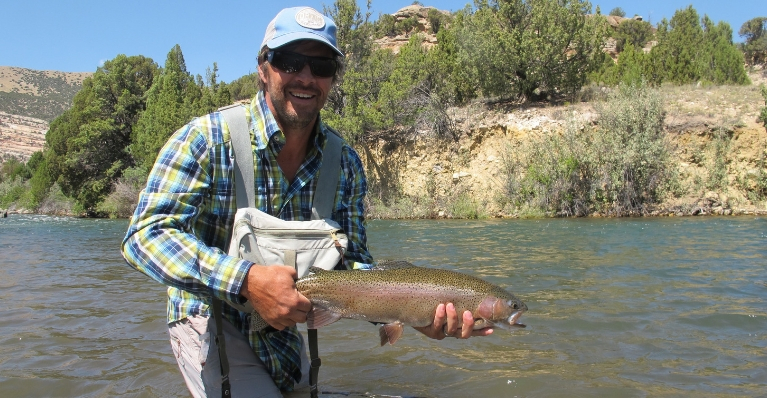
Wyoming fly fishing options include both wade and drift boat fishing as well as backcountry camping trips on horseback.
Volunteers Needed for Spring-Summer Youth Fly Fishing Classes; Sign Up For February 29 Training Session
Oak Brook TU is seeking volunteers for its 16th year of youth fly fishing classes.
These classes cover a basic discussion of fly fishing tackle–rods, reels lines and leaders–and the different types of flies to imitate different foods as well as flyrod casting instruction. There are sections on knot tying, outdoor safety, and fly tying. All of these activities provided a hands-on taste of the sport of fly fishing.
Classes are held once a month from 8:30 a.m. to 4:30 p.m. at the Camp Sagawau Environmental Learning Center — a unit of the Cook County Forest Preserves located at 12545 West 111th Street, Lemont, IL, with fishing on nearby Cook County Forest Preserve ponds and Lakes in the Palos area.
To sign up for our “Training Session” on Saturday, February 29, from 9 a.m. to 11:30 a.m. at the Camp Sagawau Forest Preserve Learning Center please contact Mike Lesiak:
E: [email protected]
M: 630.300.4997
See our
Youth Fly Fishing Class web page
for 2020 dates.
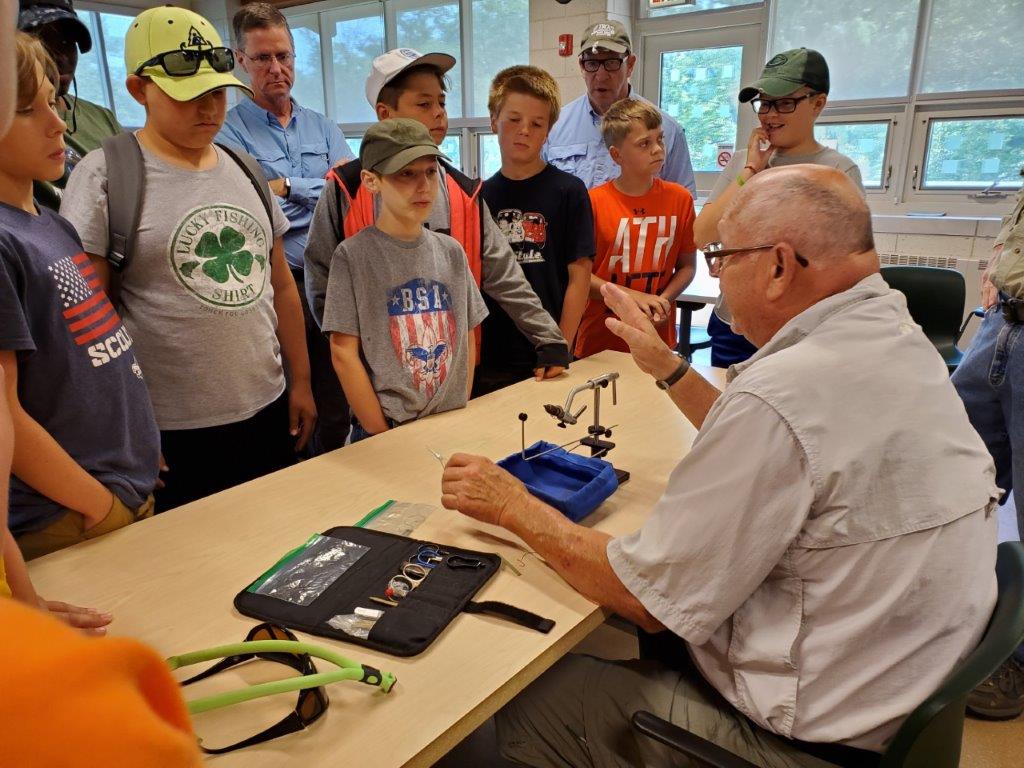
Youth classes feature fly tying, flyrod casting and fishing!
OBTU Elects New Officers and Directors
The January 15, 2019 Oak Brook TU membership meeting featured the chapter’s annual election of Officers and Directors nominated by the Leadership Development and Nominating Committee.
The current Board of Directors elected the following officers to serve a term of one year in the offices as indicated below:
President: Willie Beshire
Vice President: Dave Carlson
Secretary: Carol Hennessy
Treasurer: Jack Potts
Meeting attendees elected as returning Board Directors Ken Krueger and Lisa Gilmore to three-year terms. Ken will continue to serve as the chapter’s Membership Chair responsible for new membership recruitment and management of the chapter’s current membership database. Lisa Gilmore will continue to serve as the Leadership Development Chair.
To learn more about Board positions and other volunteer opportunities, please contact Lisa Gilmore, Leadership Development and Nominating Committee Chair or the appropriate Officer or Director listed in the OBTU Board Contact Listing on the website “Leadership” page.
